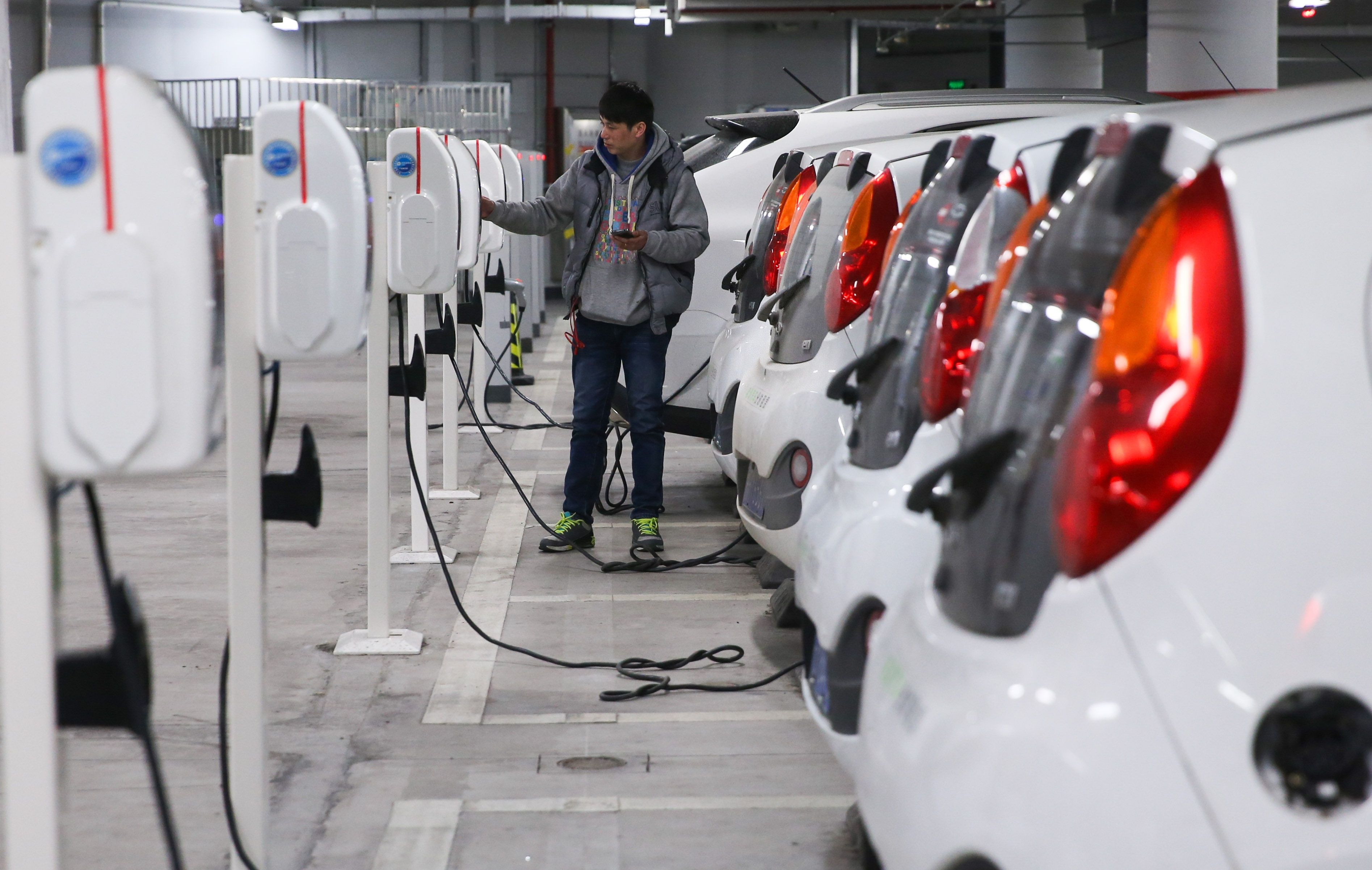Auto Dealers Push Back Against Mandatory Electric Vehicle Sales

Table of Contents
Financial Concerns and Infrastructure Gaps
A major hurdle for auto dealers facing mandatory EV sales is the substantial financial investment required to adapt their businesses. Transitioning to an EV-centric model necessitates significant upfront costs. This includes the installation of expensive EV charging stations, specialized training for mechanics to service EV components, and the added expense of maintaining an inventory of EVs, which often have higher initial costs than comparable gasoline-powered vehicles. Many dealerships, especially smaller ones, lack the capital for these significant upgrades.
Furthermore, the lack of robust charging infrastructure in many regions compounds these financial difficulties. The limited availability of public charging stations creates range anxiety among potential EV buyers, hindering consumer confidence and impacting sales. This infrastructure deficit makes it difficult to justify the investment in EV-specific infrastructure for dealers, especially in areas with low EV adoption rates.
- High cost of installing EV charging stations: The expense of purchasing, installing, and maintaining fast-charging stations can be prohibitive for many dealerships.
- Need for specialized EV mechanic training: Training technicians to diagnose and repair EVs requires substantial investment in time and resources.
- Lower profit margins on EVs compared to ICE vehicles: Dealers often report lower profit margins on EVs due to factors such as higher manufacturing costs and intense competition.
- Uncertainty around consumer demand for EVs in certain markets: The demand for EVs varies considerably across geographical regions, making investment planning difficult for dealers.
Consumer Demand and Market Readiness
A key argument against mandatory EV sales is the assertion that the market is not yet ready for such a drastic shift. While EV sales are increasing, they still represent a relatively small percentage of the overall vehicle market. Many consumers remain hesitant due to several factors. Range anxiety, the fear of running out of battery charge before reaching a charging station, remains a significant barrier. Charging times, even with fast chargers, are generally longer than refueling a gasoline vehicle. Moreover, affordable EVs are still limited, putting them out of reach for a large segment of the population.
Analyzing consumer preference data clearly demonstrates that many potential buyers remain unconvinced about the benefits of EVs compared to the familiarity and convenience of internal combustion engine (ICE) vehicles. Until these concerns are adequately addressed, mandatory EV sales are likely to be counterproductive.
- Range anxiety remains a major barrier to EV adoption. Concerns about limited driving range and the availability of charging stations are widespread among potential EV buyers.
- Lack of affordable EV options for many consumers. The high upfront cost of many EVs restricts their accessibility to a substantial part of the population.
- Limited public charging infrastructure in many areas. The lack of convenient and reliable public charging networks continues to hamper EV adoption.
- Concerns about the lifespan and resale value of EVs. Uncertainty about the long-term reliability and resale value of EVs is another factor influencing consumer decisions.
Government Regulations and Support for Dealers
The success of a transition to electric vehicles hinges significantly on supportive government policies. Many dealers argue that current government regulations are insufficient and lack the necessary financial incentives and support mechanisms needed to facilitate a smooth transition. The absence of substantial government funding for dealership EV infrastructure upgrades places an undue burden on dealerships, particularly smaller ones that may lack the financial resources to invest independently. Furthermore, complex and often contradictory regulations around EV sales and servicing increase the administrative burden on dealers.
Without substantial government support, including financial incentives, tax breaks, and streamlined regulations, mandatory EV sales could disproportionately harm small and medium-sized dealerships, potentially leading to business closures and job losses.
- Insufficient government funding for dealership EV infrastructure upgrades. Dealerships require substantial financial assistance to cover the costs of installing charging stations and upgrading their facilities.
- Complex and burdensome regulations related to EV sales and servicing. Streamlined regulations are necessary to reduce the administrative burden on dealerships.
- Lack of clear guidelines and support for dealer training programs. Dealers require comprehensive training programs to service and repair EVs effectively.
- Potential for unfair competition from larger dealerships. Larger dealerships with greater financial resources may have an unfair competitive advantage in the transition to EVs.
The Impact on the Automotive Workforce
The shift to EVs also raises serious concerns about the automotive workforce. The reduced demand for mechanics specializing in internal combustion engines could lead to significant job losses in dealerships. This necessitates comprehensive retraining and upskilling programs to equip the workforce with the necessary skills to service and repair EVs. Government-funded initiatives are crucial for a just transition, mitigating the negative social and economic consequences for those affected by this industry transformation. While new job opportunities in EV-related fields are expected, proactive measures are needed to ensure a smooth transition for existing automotive workers.
- Potential job displacement for mechanics specializing in internal combustion engines. The demand for traditional mechanics will decline as EVs become more prevalent.
- Need for government-funded retraining programs for automotive workers. Investing in retraining programs is crucial to ensure a smooth transition for affected workers.
- Importance of creating a just transition for affected workers. Support measures are necessary to prevent economic hardship for those facing job displacement.
- Potential for new job creation in EV-related fields. The transition to EVs will create new employment opportunities in areas such as EV maintenance and battery technology.
Conclusion: Navigating the Future of Mandatory Electric Vehicle Sales
The arguments against mandatory electric vehicle sales are multifaceted and highlight significant challenges. Financial concerns, market readiness issues, inadequate government support, and the impact on the automotive workforce all point to the need for a more nuanced and balanced approach. A rapid, mandated transition risks undermining the economic viability of dealerships, harming consumers through limited choices and higher costs, and creating social disruption for automotive workers. Instead, a phased approach that combines consumer education, infrastructure development, and robust government support is essential to ensure a successful and equitable transition to a sustainable automotive future.
We encourage readers to learn more about the debate surrounding mandatory electric vehicle sales, engage in thoughtful discussions about policies impacting the automotive industry, and contact their representatives to voice their concerns or support for regulations that responsibly manage this crucial transition. Further research into the effects of mandatory electric vehicle sales on various communities is also crucial for creating policies that serve the public interest.

Featured Posts
-
 Big Bear Ai Stock Plunges After Disappointing Q1 Earnings
May 20, 2025
Big Bear Ai Stock Plunges After Disappointing Q1 Earnings
May 20, 2025 -
 Chivas Regal And Charles Leclerc A Winning Partnership
May 20, 2025
Chivas Regal And Charles Leclerc A Winning Partnership
May 20, 2025 -
 1 Reason To Buy This Ai Quantum Computing Stock Now
May 20, 2025
1 Reason To Buy This Ai Quantum Computing Stock Now
May 20, 2025 -
 Analyzing The Recent Rise Of D Wave Quantum Inc Qbts Stock
May 20, 2025
Analyzing The Recent Rise Of D Wave Quantum Inc Qbts Stock
May 20, 2025 -
 Eurovision 2025 From Hypnotic Hits To Atrocious Misses A Definitive Ranking
May 20, 2025
Eurovision 2025 From Hypnotic Hits To Atrocious Misses A Definitive Ranking
May 20, 2025
Latest Posts
-
 The Goldbergs Exploring The Shows Humor Characters And Lasting Impact
May 21, 2025
The Goldbergs Exploring The Shows Humor Characters And Lasting Impact
May 21, 2025 -
 Vybz Kartel Opens Up Skin Bleaching And The Search For Self Acceptance
May 21, 2025
Vybz Kartel Opens Up Skin Bleaching And The Search For Self Acceptance
May 21, 2025 -
 The Goldbergs Behind The Scenes Facts And Trivia You Didnt Know
May 21, 2025
The Goldbergs Behind The Scenes Facts And Trivia You Didnt Know
May 21, 2025 -
 Bp Executive Pay 31 Reduction Reported
May 21, 2025
Bp Executive Pay 31 Reduction Reported
May 21, 2025 -
 The Impact Of Self Love On Vybz Kartels Skin Bleaching Decision
May 21, 2025
The Impact Of Self Love On Vybz Kartels Skin Bleaching Decision
May 21, 2025
